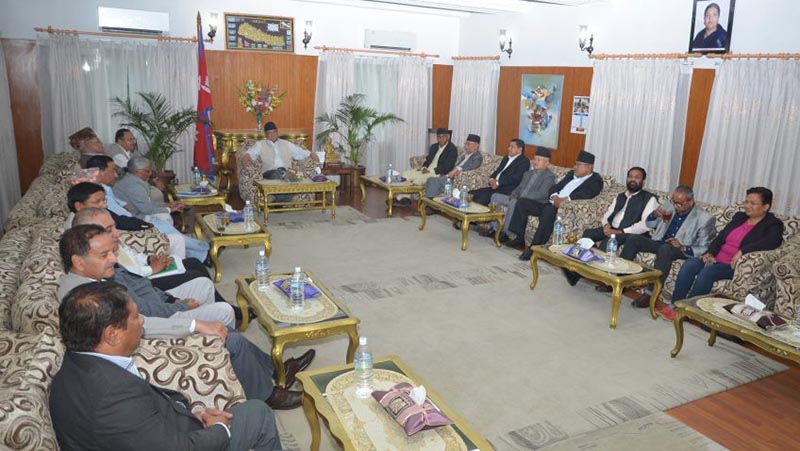Five parties’ parleys to continue
- Trying hard to forge consensus on vexing issues
Kathmandu, April 25
A five-party meeting held at Prime Minister Pushpa Kamal Dahal’s official residence tonight decided to forge consensus through dialogue on issues of constitution amendment and forthcoming local level elections.
The meeting also concluded with an understanding of continuing the dialogue among political stakeholders on constitution amendment, resumption of the House, the date for the second phase of local level polls and the new budget, according to a statement issued by the PM’s Secretariat.
The PM, who is also CPN-Maoist Centre chairman, Nepali Congress President Sher Bahadur Deuba, CPN-UML Chairman KP Sharma Oli, Deputy Prime Minister and Rastriya Prajatantra Party Chair Kamal Thapa and Madhesi Janaadhikar Forum-Democratic Chairman Bijaya Kumar Gachhadar were present during the meeting.
The top leaders also decided to continue bilateral and multilateral dialogues and discussions to resolve the contentious issues, according to UML leader Subas Chandra Nembang.
He added that Oli expressed his dismay at the government’s decision to hold the polls in two phases, table the new constitution amendment bill and hold the second phase of the election in the middle of Ramadan — a month-long holy festival of Muslims.
Oli recalled that the initial decision of holding elections in a single phase on May 14 was primarily the ruling Nepali Congress’ proposal, to which UML had no objection.
“But why has the government changed its mind and is holding polls in two phases without considering its implications?” Oli asked during the meeting.
Meanwhile, the top leaders of the three major ruling parties — NC, CPN-MC and RPP — and the main opposition UML — have decided to hold further discussion tomorrow to end the disruption of the House.
Nembang reiterated that the UML was compelled to disrupt the business of the House today to protest the government’s motive behind increasing the numbers of local bodies in some provinces.
It’s learnt that the government had written to the district development committees of 11 districts to recommend additional local level structures there.






